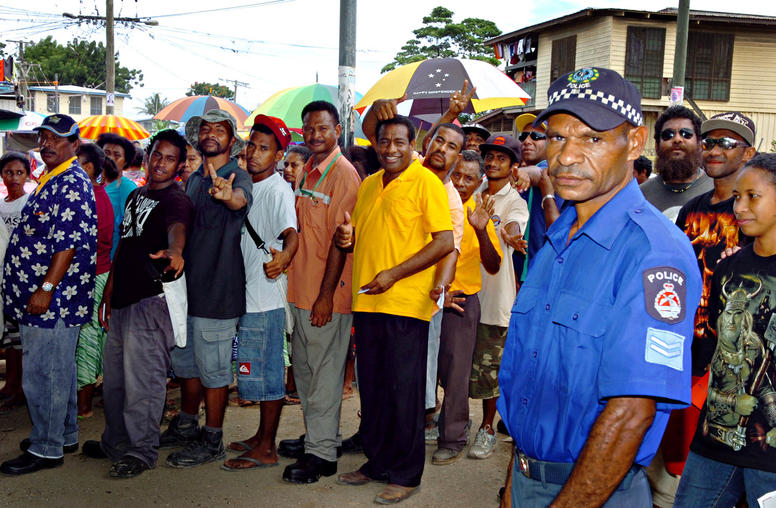#CyberspaceIRL: Rule of Law Approaches to Virtual Threats
USIP co-hosts the American Bar Association’s Rule of Law Initiative Annual Conference
A $600 billion black market, cybercrime has transformed the digital world into a sophisticated platform to steal and profit from personal data, undermine civil rights, manipulate elections, disseminate anti-democratic propaganda, and steal intelligence. Yet, cyberspaces remain largely unregulated. This lack of governance is a major challenge and concern for legal practitioners, human rights champions, and policymakers. To properly address the complex world of cybercrimes, these key players must work together to prioritize targeted strategies encompassing cross-jurisdictional cooperation, both locally and globally.
On May 21, the U.S. Institute of Peace co-hosted the American Bar Association Rule of Law Initiative’s 2019 Annual Conference. Bringing together representatives from academia, national security, and the private and public sectors, this conference identifed rule of law strategies to more effectively address this ever-changing landscape.
#CyberspaceIRL assessed whether current approaches are sufficient in addressing the complexity of issues such as money laundering, trafficking, election security, and internet freedom, and identify the breadth of actors who must be part of devising and implementing effective strategies and solutions. Read the conversation on Twitter with #CyberspaceIRL.
Agenda
8:30am – 9:00am - Registration (coffee/pastries)
9:00 – 9:15 - Welcome and Introductions
- David Yang
Vice President, Applied Conflict Transformation, U.S. Institute of Peace - Alberto Mora
Director, American Bar Association Rule of Law Initiative - Judge Margaret McKeown
Board Chair, American Bar Association Rule of Law Initiative
9:20am – 9:50am - Keynote: “Setting the Stage for the Clash of Norms in Cyberspace”
- Sujit Raman
Associate Deputy Attorney General, U.S. Department of Justice
10:00am – 11:15am - Breakout Sessions
Legal Frameworks and Regional Initiatives
- Rob Leventhal, moderator
Deputy Office Director, Office of Anticrime Programs, U.S. Department of State - Kenn Kern
Chief Information Officer, Special Assistant, International Relations, New York County District Attorney’s Office - Mary Greer
Senior Technical Advisor, Criminal Law, ABA ROLI Research, Evaluation, and Learning Office - Rodolfo Orjales
Council of Europe Consultant
Election Security and the Erosion of Trust in Democratic Institutions
- Jonas Claes, moderator
Preventing Election Violence Program Officer, U.S. Institute of Peace - Katherine Ellena
Legal Advisor, International Foundation for Electoral Systems (IFES) - Harvey Rishikof
Visiting Professor, Temple Law, former senior policy advisor to the director of national counterintelligence at the Office of the Director of National Intelligence - Saleela Salahuddin
Cybersecurity Policy Lead, Facebook
11:25am – 12:15pm - Plenary: The Tipping Point: When is Cyber Incitement Responsible for Violence? (the case of Burma/Myanmar)
- Lata Nott, moderator
Executive Director of the First Amendment Center at the Newseum - Molly Land
Associate Director of the University of Connecticut's Human Rights Institute and Professor of Law, University of Connecticut School of Law - Stephanie Kleine-Ahlbrandt
Finance and Economics Expert Panel of Experts Established pursuant to UNSCR 1874 - Richard Ashby Wilson
Gladstein Distinguished Chair of Human Rights and Professor of Law and Anthropology, University of Connecticut School of Law
12:15pm – 1:00pm - Lunch
1:00pm – 2:15pm - Breakout Sessions
Cybercrime Enforcement: Deterring State and Non-State Actors through Criminal Prosecutions
- Steven M. Kelly, moderator
Chief of Cyber Policy of the Cyber Division at the Federal Bureau of Investigation - Luke Dembosky
Partner, Debevoise & Plimpton - Michael J. Stawasz
Deputy Chief for Computer Crime, U.S. Department of Justice, Computer Crime and Intellectual Property Section - Sean Newell
Deputy Chief for Cyber, U.S. Department of Justice, Counterintelligence and Export Control Section - William Lyne
Liaison Officer, National Crime Agency, British Embassy to the United States
When Bitcoin Goes Bad: How Virtual Currencies Challenge the Rule of Law
- Adam Zarazinski, moderator
CEO, Inca Digital Securities - Elisabeth Poteat
Attorney, Department of Justice, National Security Division - Michael Sachs
Chief, Investigative Division, New York County District Attorney’s Office - Yaya J. Fanusie
Fellow, Foundation for Defense of Democracies
2:30pm – 3:40pm - Breakout Sessions
Internet Freedom: Protecting the Good Guys while Catching the Bad Guys
- Heather West, moderator
Senior Policy Manager at Mozilla - Andrea Little Limbago
Chief Social Scientist of Virtru - Bill Marczak
Research Fellow at Citizen Lab, and a Postdoctoral Researcher at UC Berkeley - Robyn Greene
Privacy Policy Manager, Facebook
Trafficking in the Digital Age
- Jessie Tannenbaum, moderator
Legal Advisor, Research, Evaluation, and Learning Division, ABA ROLI - Danielle Kessler
Senior Policy and Outreach Manager, International Fund for Animal Welfare - Evan Ratliff
Journalist and author of The Mastermind: Drugs, Empire, Murder, Betrayal - Robert E. Bornstein
Assistant Special Agent in Charge, Criminal Division, Branch 1 of the Federal Bureau of Investigation’s Washington Field Office
3:45pm – 4:30pm - Closing Keynote Session: “Shaping the Future of the Cyber Landscape”
- Glenn S. Gerstell
General Counsel, National Security Agency - Judge James E. Baker
ROLI Board & Syracuse University
4:30pm – 5:30pm - Reception



